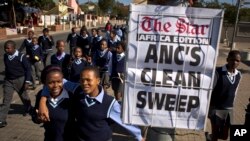JOHANNESBURG —
Like millions of his fellow South Africans, Zoheb Khan woke early on Wednesday to cast his vote in the nation’s fifth all-race elections since the end of white minority rule in 1994.
Arriving at his Johannesburg polling station before its 7:00 a.m. opening, he and his 18-year-old sister waited for more than an hour to vote.
There just was one little problem. Khan still hadn’t decided who vote for.
“I’m back and forth a lot, I haven’t made the final decision yet," he admitted, standing some 15 meters from the polling booth. "The party I have traditionally voted for has let me down a bit. I think there’s only one other viable option [and] I don’t like them either, so it’s complicated.”
Many South Africans say the party they’ve long supported, the ruling African National Congress, has failed to address longstanding inequality and provide basic services, and has been hurt by multiple corruption scandals. But many also point to a weak and untested opposition whose political foibles make them difficult to support.
Khan, a 28-year-old academic researcher, is part of an emerging demographic in this election, which comes 20 years after South Africa ended apartheid and became a democracy. Despite their growing cynicism that has tinged the campaign, many are nonetheless proud and thrilled to participate.
Even Khan’s sister Johara — a member of the so-called “Born Free,” post-apartheid generation — says she won't let her older brother's indecision dampen the excitement of voting for the first time.
"Generally, I want to vote for a party that’ll do the most good in South Africa, because right now I don’t think we’re in a very good place, so I want to vote for a party that will definitely make a difference,” she said.
Johannesburg's usually packed streets were nearly empty Wednesday, and finding polling stations became very easy. By following any car on the road, one would end up at a polling station thronged with a diverse crowd.
At several polling stations, the mood was jubilant, with voters bringing family members, pets and children. Some voters donned rainbow colors of the South African flag while others wore gear from national sports teams.
While analysts say the ruling ANC will cruise to an easy victory with at least 63 percent of the vote, for many voters, such as 28-year-old Melisizwe Notwala, the decision to support the ANC is an emotional one.
Banned under apartheid, ANC officials and their many supporters suffered.
“It’s a matter of loyalty," Notwala said. "I know exactly where I am coming from, the sacrifice that was paid for where I am today. So I will just go there and do the right thing, for my family, as well as for my children.”
Maria Matlalias, 54, has voted in all five elections since she was granted voting rights in 1994. She said she used to support the ANC — but no longer.
“I want to change because the other one we was voting for here is not good," she said. "Now we have to change to vote another party, to get something, like water, electricity, a better life.”
But Gracia Moreroa, also 54, says she’s giving the ruling party one more chance, although she has seen few fruits of South African development. Denied government-subsidized housing, Moreroa still uses an outdoor toilet in her home just outside Johannesburg.
“For five years, if nothing changes, if I’m still alive, then I’m not going to vote. I promise. Because it won’t help me to vote,” she said.
If nothing else, today's election seems to reflect a new facet of the Rainbow Nation — not just a country of different races, as the term originally implied, but a community of people with wildly differing views who believe their differences should never again force them apart.
According to the Associated Press, some 25 million South Africans, about 50 percent of South Africa's population, have registered to vote in the parliamentary elections that will also determine the president.
Results are expected on May 10.
Arriving at his Johannesburg polling station before its 7:00 a.m. opening, he and his 18-year-old sister waited for more than an hour to vote.
There just was one little problem. Khan still hadn’t decided who vote for.
“I’m back and forth a lot, I haven’t made the final decision yet," he admitted, standing some 15 meters from the polling booth. "The party I have traditionally voted for has let me down a bit. I think there’s only one other viable option [and] I don’t like them either, so it’s complicated.”
Many South Africans say the party they’ve long supported, the ruling African National Congress, has failed to address longstanding inequality and provide basic services, and has been hurt by multiple corruption scandals. But many also point to a weak and untested opposition whose political foibles make them difficult to support.
Khan, a 28-year-old academic researcher, is part of an emerging demographic in this election, which comes 20 years after South Africa ended apartheid and became a democracy. Despite their growing cynicism that has tinged the campaign, many are nonetheless proud and thrilled to participate.
Even Khan’s sister Johara — a member of the so-called “Born Free,” post-apartheid generation — says she won't let her older brother's indecision dampen the excitement of voting for the first time.
"Generally, I want to vote for a party that’ll do the most good in South Africa, because right now I don’t think we’re in a very good place, so I want to vote for a party that will definitely make a difference,” she said.
Johannesburg's usually packed streets were nearly empty Wednesday, and finding polling stations became very easy. By following any car on the road, one would end up at a polling station thronged with a diverse crowd.
At several polling stations, the mood was jubilant, with voters bringing family members, pets and children. Some voters donned rainbow colors of the South African flag while others wore gear from national sports teams.
While analysts say the ruling ANC will cruise to an easy victory with at least 63 percent of the vote, for many voters, such as 28-year-old Melisizwe Notwala, the decision to support the ANC is an emotional one.
Banned under apartheid, ANC officials and their many supporters suffered.
“It’s a matter of loyalty," Notwala said. "I know exactly where I am coming from, the sacrifice that was paid for where I am today. So I will just go there and do the right thing, for my family, as well as for my children.”
Maria Matlalias, 54, has voted in all five elections since she was granted voting rights in 1994. She said she used to support the ANC — but no longer.
“I want to change because the other one we was voting for here is not good," she said. "Now we have to change to vote another party, to get something, like water, electricity, a better life.”
But Gracia Moreroa, also 54, says she’s giving the ruling party one more chance, although she has seen few fruits of South African development. Denied government-subsidized housing, Moreroa still uses an outdoor toilet in her home just outside Johannesburg.
“For five years, if nothing changes, if I’m still alive, then I’m not going to vote. I promise. Because it won’t help me to vote,” she said.
If nothing else, today's election seems to reflect a new facet of the Rainbow Nation — not just a country of different races, as the term originally implied, but a community of people with wildly differing views who believe their differences should never again force them apart.
According to the Associated Press, some 25 million South Africans, about 50 percent of South Africa's population, have registered to vote in the parliamentary elections that will also determine the president.
Results are expected on May 10.





